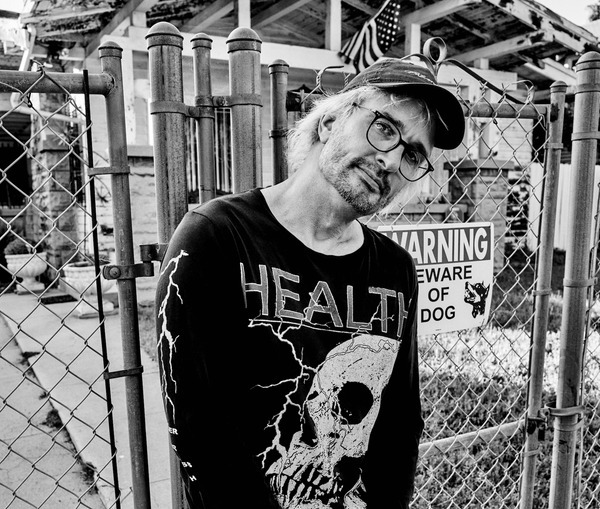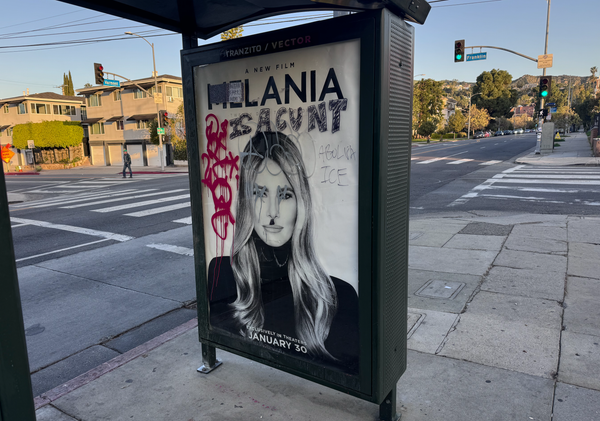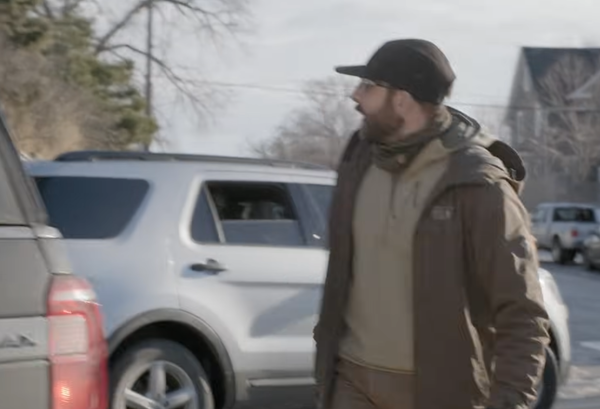NFTs will kill us all
Buckle in, the future's not bright
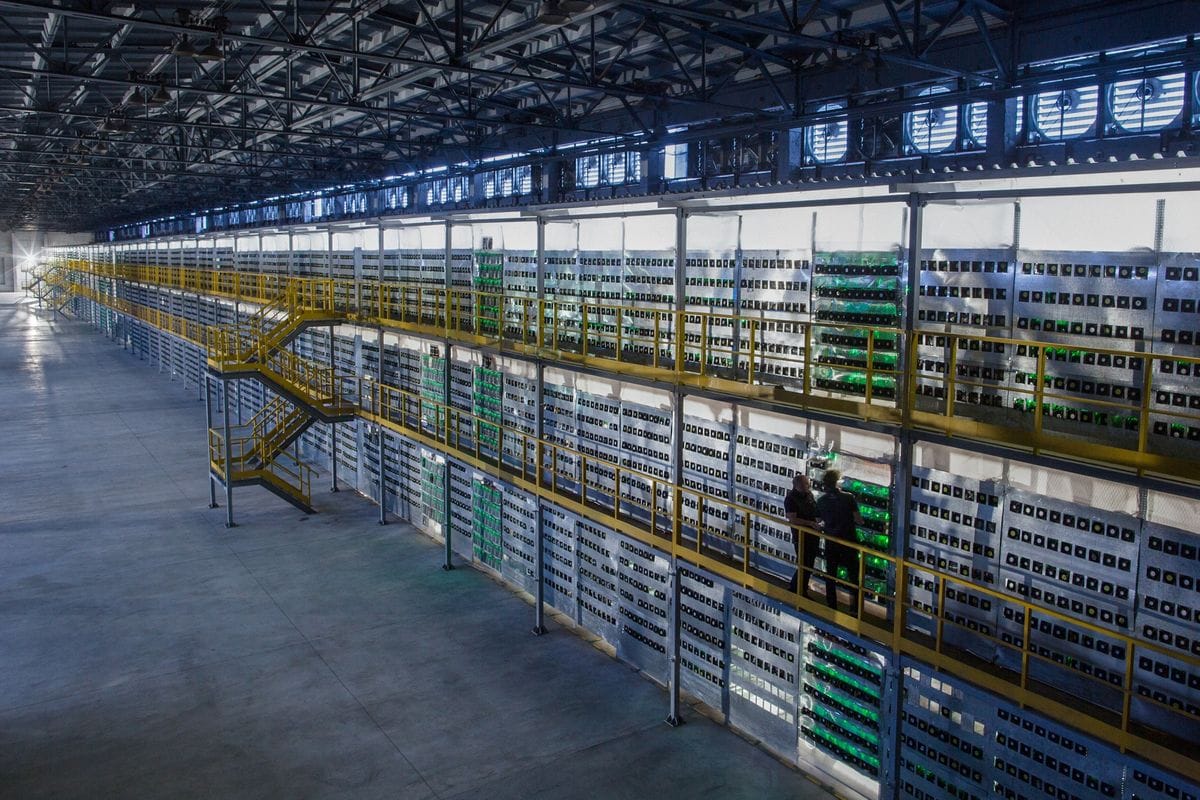
Hi,
You may recall the artist I spoke to last week who’d just made $22,000 selling NFTs. As they pointed out to me, “any digital file you have on your grubby little hard drive can be tokenised.”
That token is added to this giant clusterfuck of the blockchain which means that shitty digital things (like Jack Dorsey’s first tweet) are now deemed totally unique (like the Mona Lisa) and suddenly people are willing to pay millions to own them.
I could release this newsletter as an NFT if I wanted to. I won’t.
“Like a Pokemon card, or an original Picasso drawing or the actual frame of a Disney animated film from 1955, NFTs are designed to be the one and only, a shred of non-fungible reality in a world gone digital. You either own this thing or you don’t,” writes Seth Godin.
Or as someone put it more bluntly on Twitter:
every time I think about NFT art I just get angry again at how stupid the whole thing is, not like stupid as in “new faddish stuff may not hold water”, stupid as in literally the entire premise is fucking idiotic, you're paying for a receipt that says “i paid money” and that’s it
ME: “give me twenty dollars and I will say the word ‘the’ to you”
YOU: deal
ME: “the”
YOU: great, thanks man
~ LATER ~
YOU: so now I own Josh saying “the” that one time
THEM: so he can't say “the” anymore?
YOU: no he can, but
THEM: but he can't say it for $?
YOU: no he can, but…
Look, I am not going to go over the science. No-one understands it. All you need to know is that it’s all stupid. But there’s another side to all this that’s important to note, and it was summed up wonderfully by Eric:
What’s an NFT? Imagine if you could burn a half ton of coal and a small forest to print a “Certificate of Authenticity” for a GIF.
Because yeah, wrangling all that data and solving all those riddles on the blockchain is — not good. Here’s what it looks like:
Bitcoin: Initiated
— Matt Lohstroh (@lohstroh) 2:46 PM ∙ Feb 8, 2021
Watching that makes me as nauseous as watching oil drilling in action:
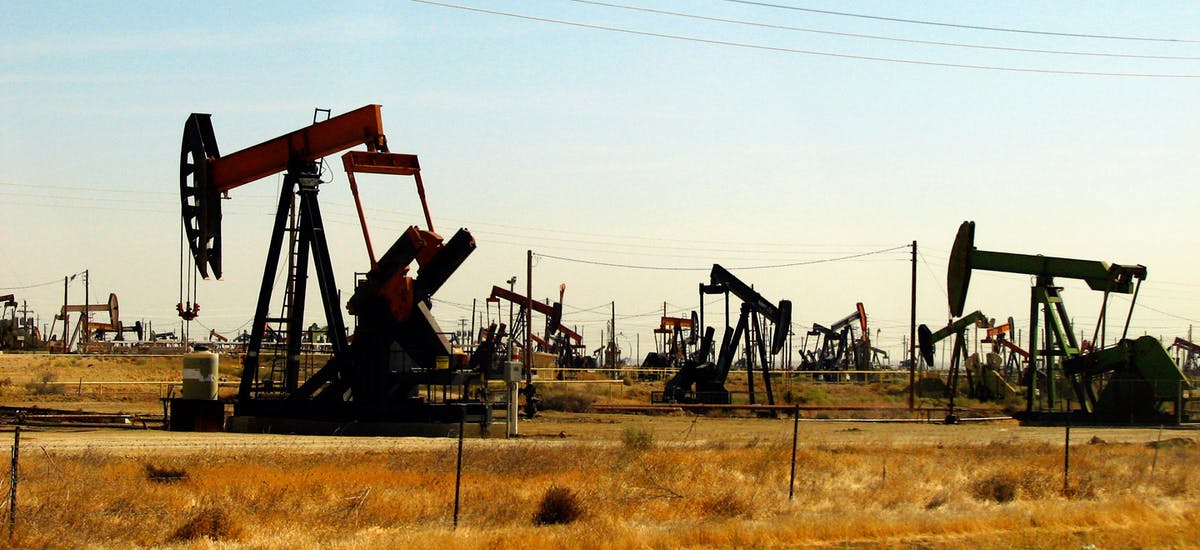
Artist Joanie Lemercier had embraced NFTs for her own artwork, until realising how shitty it was for the planet. She writes about this really compellingly in The problem of CryptoArt:
“It turns out my release of six CryptoArt works consumed in 10 seconds more electricity than the entire studio over the past two years.”
A lot of her maths was based on this piece by Memo Akten — The Unreasonable Ecological Cost of CryptoArt:
“A single Ethereum transaction is estimated to have a footprint on average of around 35 kWh. This in itself, is ludicrously high. To put that into perspective, this is roughly equivalent to an EU resident’s electric power consumption for four days.”
When you add up the number of Ethereum transactions taking every second — it adds up.
“A single click of a mouse sets off a chain reaction and sends a signal to mining farms around the world, which go on to have a footprint of 35 kWh for an ‘average’ transaction, with emissions of close to 20 KgCO2 for that single mouse click.
To compare — Akten calculates an email has a footprint of around two grams of CO2, and that an hour of Netflix has a footprint of around 36 grams. Basically:
“An Ethereum transaction is thousands times more costly than other internet activities that individuals typically engage in.”
While writing this piece, I talked to a number of people involved in NFT sales, and many of them are aware of the damage.
“I calculated my own transactions involved and it was the equivalent of driving 1500km” wrote one. But then — we’ve all got to make a living, right? Hell, people have mortgages to pay, children to feed. There is something aspirational about cryptocurrencies like Bitcoin and Ethereum. Writer Lana Swartz describes them as a “kind of true belief that can bend reality”:
“When everything is crumbling, cryptocurrency feels like it stands beyond that everything and yet is the center of everything. Some, particularly in the Ethereum community, are actually trying to build technological infrastructures that promise new kinds of futures — better ones. Sometimes, these too are scam futures: Belief in them is not evenly shared by all participants. But even if you’re just hodling and memeing, crypto lets you manage the future. It allows you to be simultaneously optimistic and pessimistic, constructive and cynical.”
But while some are just getting on board the NFT train in order to get by, I’d argue some are making more than a living. Twitter founder Jack Dorsey is about to sell his first tweet for $2.5 million dollars. A digital artist known as Beeple (real name Mike Winkelmann) just sold an NFT of his work at auction house Christie’s for $69 million. Yes, even Christie’s — home of old artefacts and framed art — is getting in on the scam.
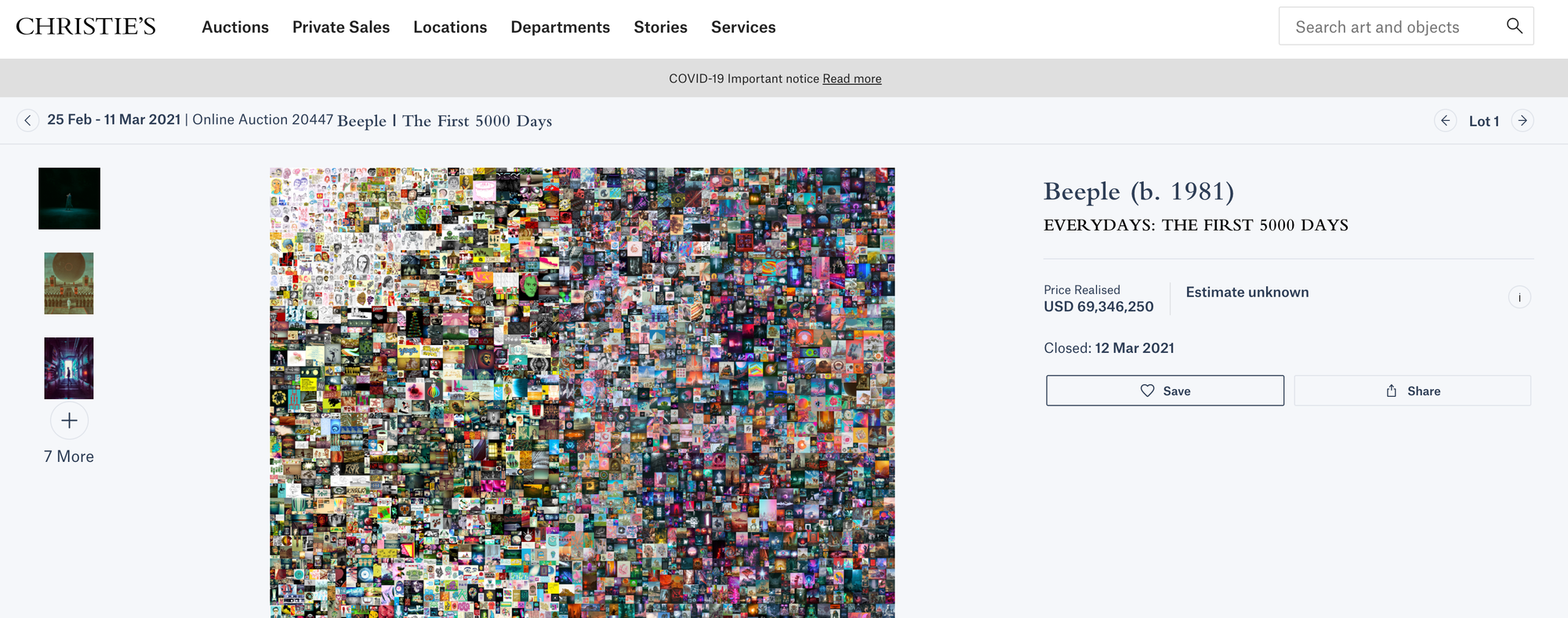
I mean — on one hand, fuck all of this. Art driven not by a drive to say something but a desire to get really, really rich. An artificially created scarcity made by stupid humans. I used to get annoyed at people hoarding gold, but at least gold is a real thing you can touch. When I think about gold I think of cute old men by the river shuffling pans around.
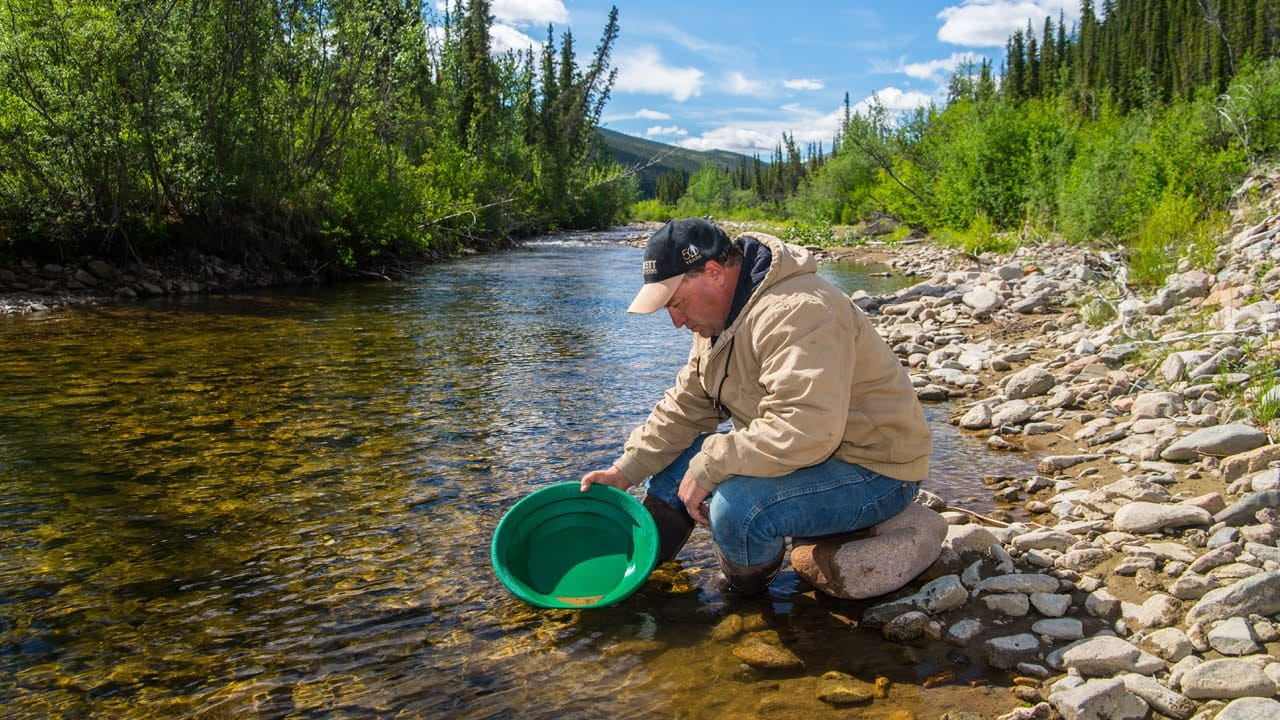
Compare and contrast with this server farm in Russia, built my millionaires to mine for bitcoin. I imagine there are similar setups for Ethereum.

But also: just existing and being alive as a human is terrible for the environment. Having a child is the worst thing you can do for the earth. Breeding is the worst thing you can do! (Unless they grow up into the adult that solves climate change). The human race wreaks havoc on the environment. We’re all horrible cockroaches plaguing the planet. I’m with Agent Smith on the issue. Humans suck. Everything we do is terrible.
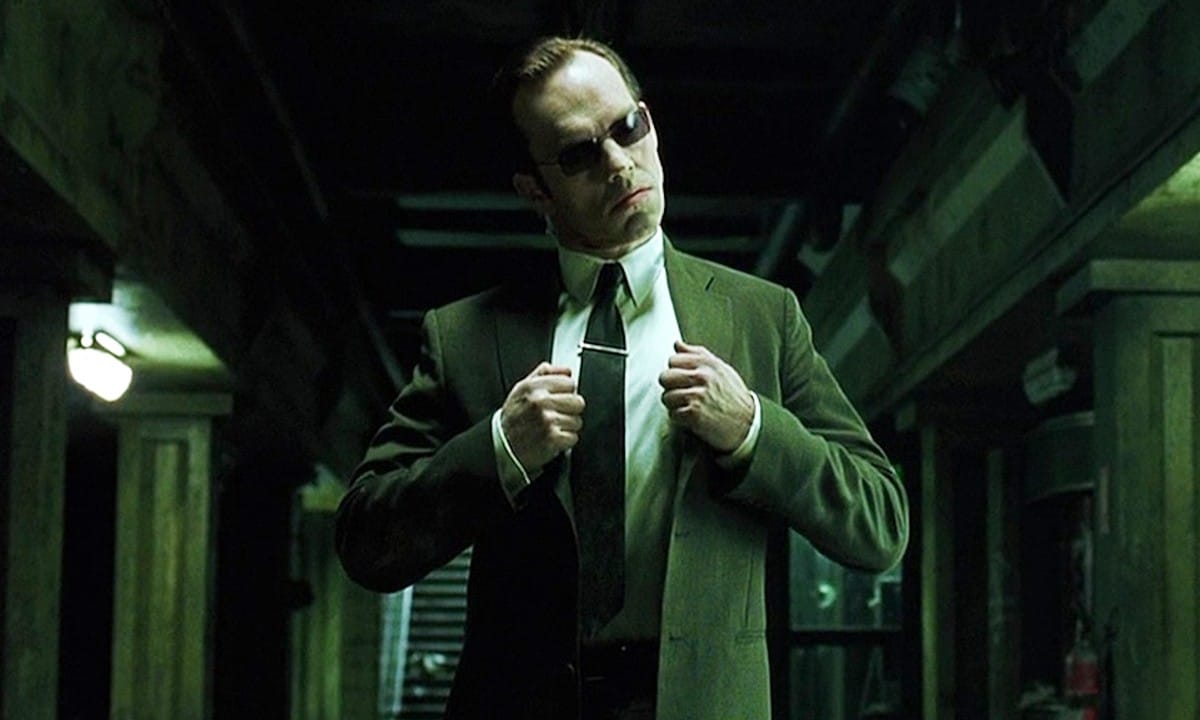
Perhaps this is just one more nail in our coffin. Maybe NFT’s are just another part of the death spiral. Another race to the bottom:
“For the foreseeable future, the method that’s used to verify the blockchain and to create new digital coins is deliberately energy-intensive and inefficient. That’s on purpose. And as they get more valuable, the energy used will go up, not down. It’s an ongoing waste that creates little in ongoing value and gets less efficient and more expensive as time goes on.”
I hate all of this. To me, the hunger in the crypto world illustrates all the worst things about people: Our greed, our need to “own” things, and our inability to see the bigger picture. But then — how can’t I be happy for artists who are finally able to pay the bills? Gah! I’m so conflicted!
I hate that I even have to think about this. I’d rather watch this video 1000 times instead.
It’s pointless, but at least a piece of bread falling over makes sense. And look, if NFTs are going to kill us all (by killing this rock we call home) then maybe we take the inevitable step and tokenise ourselves: adding our own identity onto the blockchain and sailing off into the digital ether.
“You are a valuable asset that can be tokenised as such. Don’t you ever let anyone ever tell you otherwise! And when we say you, we mean each and every one of you — all 7.8bn-odd of you out there. You are many but you are scarce! Scarcity is value. Value is harnessed on the blockchain. The blockchain’s possibilities are infinite. Infinite scarcity for the win!”
Oh god.
David.
PS: if you want to share this Webworm, it’s webworm.co/p/nfts

